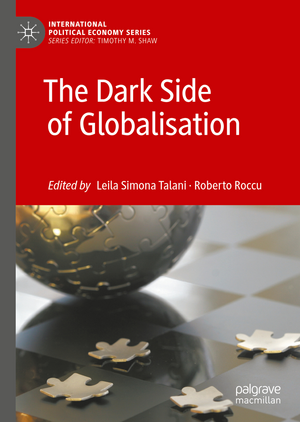The Dark Side of Globalisation: International Political Economy Series
Editat de Leila Simona Talani, Roberto Roccuen Limba Engleză Hardback – 10 apr 2019
Din seria International Political Economy Series
- 9%
 Preț: 831.25 lei
Preț: 831.25 lei - 20%
 Preț: 751.84 lei
Preț: 751.84 lei - 17%
 Preț: 490.25 lei
Preț: 490.25 lei - 17%
 Preț: 363.48 lei
Preț: 363.48 lei - 20%
 Preț: 690.96 lei
Preț: 690.96 lei - 20%
 Preț: 627.55 lei
Preț: 627.55 lei - 9%
 Preț: 762.80 lei
Preț: 762.80 lei -
 Preț: 430.59 lei
Preț: 430.59 lei -
 Preț: 428.68 lei
Preț: 428.68 lei -
 Preț: 147.23 lei
Preț: 147.23 lei - 20%
 Preț: 566.64 lei
Preț: 566.64 lei -
 Preț: 385.08 lei
Preț: 385.08 lei -
 Preț: 389.11 lei
Preț: 389.11 lei - 15%
 Preț: 644.30 lei
Preț: 644.30 lei -
 Preț: 389.31 lei
Preț: 389.31 lei - 15%
 Preț: 644.30 lei
Preț: 644.30 lei -
 Preț: 413.84 lei
Preț: 413.84 lei -
 Preț: 387.38 lei
Preț: 387.38 lei - 15%
 Preț: 638.89 lei
Preț: 638.89 lei - 15%
 Preț: 644.63 lei
Preț: 644.63 lei - 18%
 Preț: 893.71 lei
Preț: 893.71 lei -
 Preț: 412.47 lei
Preț: 412.47 lei -
 Preț: 325.08 lei
Preț: 325.08 lei -
 Preț: 395.47 lei
Preț: 395.47 lei - 15%
 Preț: 641.85 lei
Preț: 641.85 lei -
 Preț: 391.40 lei
Preț: 391.40 lei -
 Preț: 388.34 lei
Preț: 388.34 lei - 15%
 Preț: 640.55 lei
Preț: 640.55 lei -
 Preț: 389.70 lei
Preț: 389.70 lei - 15%
 Preț: 646.30 lei
Preț: 646.30 lei - 15%
 Preț: 637.78 lei
Preț: 637.78 lei - 15%
 Preț: 643.84 lei
Preț: 643.84 lei -
 Preț: 386.99 lei
Preț: 386.99 lei - 15%
 Preț: 641.53 lei
Preț: 641.53 lei -
 Preț: 386.81 lei
Preț: 386.81 lei - 15%
 Preț: 639.73 lei
Preț: 639.73 lei - 18%
 Preț: 944.19 lei
Preț: 944.19 lei -
 Preț: 391.40 lei
Preț: 391.40 lei -
 Preț: 330.65 lei
Preț: 330.65 lei -
 Preț: 394.12 lei
Preț: 394.12 lei -
 Preț: 386.99 lei
Preț: 386.99 lei -
 Preț: 386.81 lei
Preț: 386.81 lei -
 Preț: 387.75 lei
Preț: 387.75 lei - 15%
 Preț: 634.68 lei
Preț: 634.68 lei -
 Preț: 392.60 lei
Preț: 392.60 lei - 15%
 Preț: 641.53 lei
Preț: 641.53 lei - 15%
 Preț: 640.06 lei
Preț: 640.06 lei - 15%
 Preț: 643.16 lei
Preț: 643.16 lei - 15%
 Preț: 642.68 lei
Preț: 642.68 lei - 15%
 Preț: 641.85 lei
Preț: 641.85 lei
Preț: 785.55 lei
Preț vechi: 957.99 lei
-18% Nou
Puncte Express: 1178
Preț estimativ în valută:
150.34€ • 156.37$ • 124.11£
150.34€ • 156.37$ • 124.11£
Carte tipărită la comandă
Livrare economică 14-28 aprilie
Preluare comenzi: 021 569.72.76
Specificații
ISBN-13: 9783030051167
ISBN-10: 3030051161
Pagini: 238
Ilustrații: XVII, 223 p. 12 illus., 7 illus. in color.
Dimensiuni: 148 x 210 mm
Greutate: 0.54 kg
Ediția:1st ed. 2019
Editura: Springer International Publishing
Colecția Palgrave Macmillan
Seria International Political Economy Series
Locul publicării:Cham, Switzerland
ISBN-10: 3030051161
Pagini: 238
Ilustrații: XVII, 223 p. 12 illus., 7 illus. in color.
Dimensiuni: 148 x 210 mm
Greutate: 0.54 kg
Ediția:1st ed. 2019
Editura: Springer International Publishing
Colecția Palgrave Macmillan
Seria International Political Economy Series
Locul publicării:Cham, Switzerland
Cuprins
1. Introduction: The Globalisation Debate: From De-Globalisation to the Dark Side of Globalisation.- 2. Chapter 2: Dark Futures: Super-Rich Farmers and Derivatives Markets in an Unstable World.- 3. Chapter 3: The Dark Side of Global Production Networks: Economic ‘Rebalancing’ and Labour Exploitation in China’s Contemporary Political Economy.- 4. Chapter 4: Globalisation and Irregular Migration: Does Deterrence Work?.- 5. Chapter 5: Traditional Organised Crime on the Move. Exploring the Globalisation of the Calabrian ’Ndrangheta.- 6. Chapter 6: Placing Austerity in Context: The Greek Case Between Neo-Liberal Globalisation and an Ordoliberal EU.- 7. Chapter 7: The Italian Way to Globalisation: Moving to the Dark Side. Between Irregular Migration and the Underground Economy.- 8. Chapter 8: The Shadow of Violence and Intervention: Balkan Wars as an Extralegal Deal.
Notă biografică
Leila Simona Talani is Professor of International Political Economy in the Department of European and International Studies at King’s College London, UK.
Roberto Roccu is Senior Lecturer in International Political Economy in the Department of European and International Studies at King’s College London, UK.
Roberto Roccu is Senior Lecturer in International Political Economy in the Department of European and International Studies at King’s College London, UK.
Textul de pe ultima copertă
Firmly rooted in the International Political Economy (IPE) tradition, this book addresses the negative consequences of globalisation, what is termed here the ‘dark side of globalisation’. It explores different definitions of globalisation, whether the globalisation we have seen since the 1970s is substantially new, and to what extent it can be governed. Building on these foundations, the work assesses the prospects for de-globalisation. By focusing on this dark side of globalistion, the authors show how the global economic crisis, and its various local and sectorial manifestations, intensified – rather than generated – existing trends. This scholarship provides an account of the current predicament that is both more complex and more persuasive than the opposition between globalisation and de-globalisation.
Leila Simona Talani is Professor of International Political Economy in the Department of European and International Studies at King’s College London, UK.
Roberto Roccu is Senior Lecturer in International Political Economy in the Department of European and International Studies at King’s College London, UK.
Leila Simona Talani is Professor of International Political Economy in the Department of European and International Studies at King’s College London, UK.
Roberto Roccu is Senior Lecturer in International Political Economy in the Department of European and International Studies at King’s College London, UK.
Caracteristici
Looks at the negative aspects of a ‘global economy’ and how this has growth as well as distributive implications Analyzes changes in global production networks such as the transformations in China’s political economy Explores global recessions in Europe and the underground economy resulting from conflict, displacement and migration
